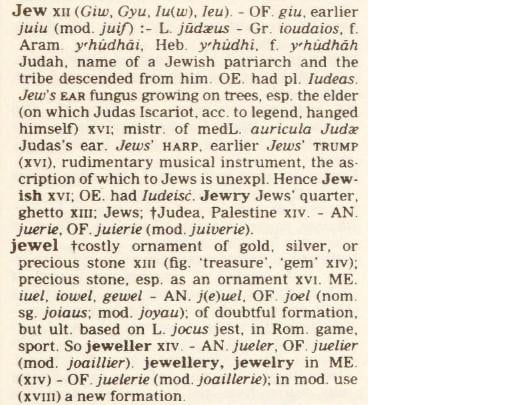
Is the word Jew short for jeweler? No, that's not true: The words Jew and jeweler have different roots, originating from different languages with changes over time. One word is not derived from the other. The word Jew originated from the Hebrew name of Jacob's son Yehudah, or Judah, which gave rise to the place name Judea. The word "jeweler" appeared in the late 14th century, having been derived from the 12th-century French word jouel for "ornament; present; gem, jewel."
The claim appeared in the text overlay of a video posted on Instagram (archived here) published by @phil_moreland on January 16, 2024. The post was captioned:
Let's Play Connect The Dots.
The text overlay at the top of the video reads:
THE TERM JEW IS SHORT FOR JEWELER NOT JUDAH

(Source: Instagram screenshot taken on Tue Jan 16 17:29:19 2024 UTC)
The video has the TikTok watermark of the account @blackoutstrike, but the video does not appear currently in that account's timeline. Additional captioning of the video's audio on topics such as African diamond mines, apartheid, De Beers diamonds, Israel, Palestine and colonialism appears at the foot of the video. These topics are outside the scope of this fact check. This article will be focused on the etymology of the words mentioned in the upper text caption, Jew and jeweler.
The website of the Oxford English Dictionary (OED) describes itself as "An unsurpassed guide for researchers in any discipline to the meaning, history, and usage of over 500,000 words and phrases across the English-speaking world." The website requires an account for access. Archived editions of the OED are available to borrow on an hourly basis from the Internet Archive, but only allow access to one entry.
Lead Stories reviewed the entries for Jew and jewel and jeweler, in the 2002 edition titled, "The Concise Oxford Dictionary of English Etymology." While the words are adjacent on the page, the OED did not show any connection between the words.
(Source: Internet Archive screenshot of The Concise Oxford Dictionary of English Etymology taken on Wed Jan 17 20:44:52 2024 UTC)
The Online Etymology Dictionary (etymonline.com) is a well-regarded online resource that does not require a subscription to access. The list of principal sources used to develop the etymological entries are listed on a separate page of the website, although each word's entry is not peppered with specific citations. As with the OED, etymonline.com does not reference any connection between the words Jew and jewel or jeweler.
The noun Jew, traces back to the Hebrew name for Jacob's fourth son Yehuda or Judah. The Tribe of Judah was descended from him and the territory they inhabited was known as Judea. Etymonline.com writes, in part:
Jew (n.)
late 12c., Giw, Jeu, 'a Jew (ancient or modern), one of the Jewish race or religion,' from Anglo-French iuw, Old French giu (Modern French Juif), from Latin Iudaeum (nominative Iudaeus), from Greek Ioudaios, from Aramaic (Semitic) jehudhai (Hebrew y'hudi) 'a Jew,' from Y'hudah 'Judah,' literally 'celebrated,' name of Jacob's fourth son and of the tribe descended from him.
The word jeweler, also spelled jeweller, is derived from the word jewel, which comes from a French word jouel. Etymonline.com writes:
jeweler (n.)
also jeweller, late 14c. (mid-14c. as a surname, Alice la Jueler), from Anglo-French jueler, juelleor, Old French juelier, juelior (Modern French joaillier), from joel 'a jewel' (see jewel).
For jewel the entry reads:
jewel (n.)
late 13c., 'article of value used for adornment,' from Anglo-French juel, Old French jouel 'ornament; present; gem, jewel' (12c.), which is perhaps [Watkins] from Medieval Latin jocale, from Latin jocus 'pastime, sport,' in Vulgar Latin 'that which causes joy' (see joke (n.)). Another theory traces it to Latin gaudium, also with a notion of 'rejoice' (see joy).
















